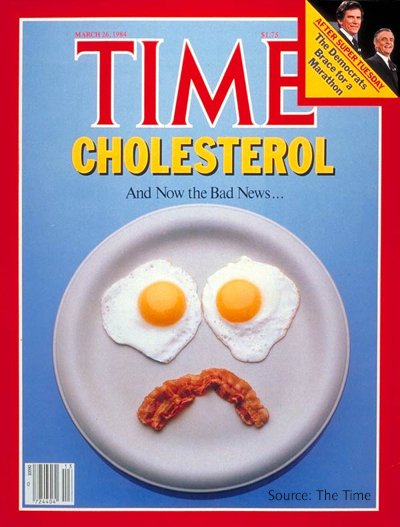
Posted on 07/25/2025 8:09:17 AM PDT by Red Badger

Are eggs healthy or unhealthy? The debate goes on. (© alain louis - stock.adobe.com)
In A Nutshell
A new study found that eating two eggs per day may lower LDL cholesterol, but only when part of a low-saturated fat diet.
Saturated fat intake, not dietary cholesterol, was directly linked to higher LDL and ApoB levels, which are markers of heart disease risk.
The egg diet increased smaller, more harmful LDL particles and reduced a beneficial HDL subtype, raising questions about long-term cardiovascular impact.
Researchers conclude that eggs are not cholesterol villains, but their effects are complex and depend on the overall diet.
========================================================================
ADELAIDE, South Australia — For decades, eggs have been dietary pariahs, banished from breakfast tables by doctors warning about cholesterol. But a new study suggests that Americans may have been avoiding the wrong culprit entirely.
Researchers found that eating two eggs daily as part of a low-saturated fat diet actually lowered bad cholesterol compared to following a high-saturated fat diet with minimal egg consumption. Meanwhile, participants who avoided eggs but ate plenty of saturated fat saw no improvement in their cholesterol levels.
As the study’s authors wrote in their American Journal of Clinical Nutrition paper, “Saturated fat, not dietary cholesterol, elevates LDL cholesterol”—a finding that could reshape how Americans think about breakfast and heart health. While millions have switched to egg whites or avoided eggs altogether, the real problem may have been lurking in butter, full-fat dairy, and fatty meats all along.
How Scientists Put Eggs to the Test
Scientists from the University of South Australia are the latest team attempting to settle this long-running “healthy eggs” debate. For their study, they recruited 61 healthy adults with normal cholesterol levels and put them through three different five-week diets in random order. It’s important to note that their study was funded by the Egg Nutrition Center (American Egg Board), though they declare that the agency had no role in the study design, data analysis, or manuscript preparation
The first diet mimicked typical eating patterns: high in both cholesterol and saturated fat, with participants limited to just one egg per week. The second diet allowed two eggs daily but kept saturated fat low by emphasizing lean meats, low-fat dairy, and plant-based proteins. The third diet eliminated eggs entirely while maintaining high saturated fat through foods like butter and full-fat yogurt.
All three diets contained the same number of calories, and participants received weekly consultations with dietitians plus $55 weekly to cover study foods. Blood tests at the end of each five-week period revealed striking differences, with 48 participants completing all three diet phases.

Hard-boiled eggs (seen here on avocado toast) are considered the best way to cook eggs, according to experts. (Photo by Foodie Factor on Pexels)
Saturated Fat Takes the Blame
The results upended conventional wisdom about eggs and cholesterol. Participants eating two eggs daily within a low-saturated fat framework saw their bad cholesterol drop by an average of 5.7 points compared to the high-saturated fat control diet.
But those avoiding eggs while maintaining high saturated fat intake? Their bad cholesterol barely budged.
Even more telling, researchers found a direct relationship between saturated fat consumption and bad cholesterol levels across all participants. For every additional gram of saturated fat consumed daily, bad cholesterol increased. Dietary cholesterol intake showed no such relationship with blood cholesterol levels.
These results also applied to apolipoprotein B, a measure many heart doctors consider an even better predictor of heart disease risk than standard cholesterol tests. This protein acts like a delivery truck for cholesterol in the blood, and higher levels mean more trucks carrying cholesterol to arteries where it can cause problems.
The Complicated Truth About Egg Cholesterol
While the overall cholesterol picture favored eggs, the study uncovered some effects that complicate the story. Participants eating two eggs daily experienced changes in their cholesterol types that could potentially offset some benefits.
Specifically, the egg diet reduced larger cholesterol particles (which are generally considered less harmful) while increasing smaller, denser particles that are more likely to contribute to artery-clogging plaques. Additionally, certain beneficial cholesterol subspecies decreased on the egg diet, including HDL subtype H4.
The researchers noted that the H4 subspecies has been linked in past studies to cardiovascular risk, with a 13 to 14 percent increase in heart attack and stroke risk for every one standard deviation drop in its levels. In this study, the H4 subspecies decreased by 0.13 standard deviations with the egg diet—an amount that, based on prior research, could translate to a roughly 1.9 percent increase in cardiovascular risk. While speculative, this contextualizes the potential trade-offs.
These results show that while eggs themselves aren’t driving cholesterol problems, their effects on the body’s cholesterol system are more complex than simply “good” or “bad.”
What This Means for Your Breakfast
Since the 1960s, health authorities have recommended limiting dietary cholesterol, with eggs often bearing the brunt despite being naturally low in saturated fat. But this study suggests throwing those dietary guidelines out the window.
Consider the typical American breakfast: many people have embraced egg white omelets while continuing to cook them in butter or serve them alongside fatty bacon. Based on these results, that approach is backwards. The whole egg is likely fine, but the cooking fat and side dishes may be the real problems.
However, the particle size results add important context. While eggs may not be the cholesterol villains they’ve been painted as, they’re not necessarily heart-healthy superfoods either, especially for people already at cardiovascular risk.
After decades of dietary exile, eggs appear ready for rehabilitation, but with conditions attached. This study provides compelling evidence that saturated fat, not dietary cholesterol, drives the blood cholesterol levels that matter for heart disease risk. For most healthy adults, eating eggs as part of a diet low in saturated fat appears not just harmless but potentially beneficial for cholesterol management.
Keep in mind that the research also reveals that eggs are complex foods with complex effects. They fit best within an overall heart-healthy dietary pattern—one that keeps saturated fat in check while allowing room for nutrient-dense whole foods, shells and all.
Disclaimer:
This study was conducted in healthy adults and followed participants for five weeks per diet. Results may not apply to people with existing cardiovascular or metabolic conditions. The research was funded by the Egg Nutrition Center (American Egg Board), though authors report the funder had no role in the study design, data analysis, or manuscript preparation. All findings should be interpreted in the context of broader dietary patterns and individual health needs.
Paper Summary
Methodology
Researchers conducted a randomized, controlled, crossover study with 61 healthy adults aged 18–60 with baseline LDL cholesterol below 135.3 mg/dL. Participants followed three different five-week diets in random order: a control diet high in both cholesterol and saturated fat with maximum one egg per week; an egg diet with two eggs daily but low saturated fat; and an egg-free diet with low cholesterol but high saturated fat. All diets were designed to be equal in calories. Blood tests and dietary monitoring occurred throughout the study, with 48 participants completing all three diet phases.
Results
The egg diet significantly reduced LDL cholesterol by 5.7 mg/dL compared to the control diet, while the egg-free diet showed no significant change. Saturated fat intake was positively correlated with LDL cholesterol levels, while dietary cholesterol intake showed no correlation. However, the egg diet also increased small LDL particles and decreased some beneficial HDL subspecies. Apolipoprotein B, considered a strong predictor of cardiovascular risk, decreased with the egg diet but not the egg-free diet.
Limitations
The study included a relatively small sample size of healthy adults only, limiting generalizability to populations with existing cardiovascular disease or metabolic conditions. Each diet phase lasted only five weeks, which may not reflect long-term effects. The lutein and zeaxanthin measurement method couldn’t distinguish between these compounds separately. Dietary compliance was monitored through self-reporting, which may introduce bias.
Funding and Disclosures
This research was funded by the Egg Nutrition Center, a division of the American Egg Board. The authors stated that the funding source had no role in study design, analysis, interpretation of data, or manuscript writing. Three authors reported receiving financial support from the Egg Nutrition Center, while other authors reported no conflicts of interest.
Publication Information
Carter, S., Hill, A.M., Yandell, C., Wood, L., Coates, A.M., & Buckley, J.D. (2025). “Impact of dietary cholesterol from eggs and saturated fat on LDL cholesterol levels: a randomized cross-over study,” published in July 2025 edition of The American Journal of Clinical Nutrition, 122, 83–91. The study was registered at clinicaltrials.gov as NCT05267522.
EGGS GOOD!........ THIS WEEK!...................
Trust the science! They say lol
I trust common sense. I never believed that bs. Along with margarine instead of butter, etc. I’ve always believed in eating natural.
They can’t figure out eggs, but by golly the science is settled on global warming, err climate change.


I have a small slice of bread with no butter....I fry it in a tablespoon of butter but most of it stays in the pan.
Occasionally, I have 3 pieces of bacon.
And occasionally, I just have home fries.
I have cereal with WHOLE milk as an evening snack.
I'm 80...not on any meds.
Old school diet. Meat, potatoes, vegies...canned peaches/pears.
No chips...no soda...
One specialist recently stated to eat six eggs ddaily.
The best way to end the debate is not to participate.
Please tell me people aren’t still deliberately throwing away the healthiest part of the egg?
Yes they are...................
Life Lesson...Think for yourself.
Cold Meatloaf sandwiches for lunch w/ mayo, S&P
Tomatoes on the side.

Two eggs, fried in butter! My usual breakfast.
I’m a poacher.................
Two every morning for me. Yum!
Yup, back when the propaganda was "egg yolks bad, only eat the whites" I laughed. The lecithin in the whites counteracts the "evil" cholesterol in the yolks. Imagine that, Mother Nature knows what she's doing.
I’ve tried “egg white ____” recipes and they are all disgusting. I love egg whites... when mixed with the yoke.
Butter is now almost considered a “super food,” surprisingly.
Man, did that come full circle.
Disclaimer: Opinions posted on Free Republic are those of the individual posters and do not necessarily represent the opinion of Free Republic or its management. All materials posted herein are protected by copyright law and the exemption for fair use of copyrighted works.